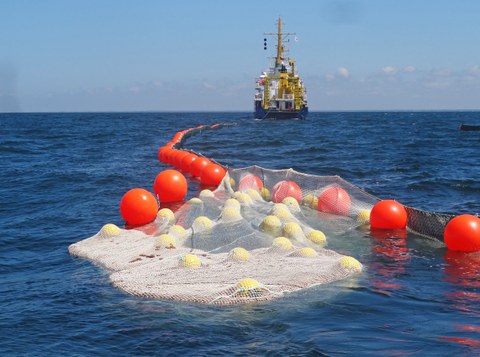Jan 07, 2019
Ecological approach to fighting oil spills invented by wood technology researchers at TU Dresden established in the Baltic region
Wood technology researchers at TU Dresden have developed wood fibre-based binding agents that are able to almost completely eliminate oil disasters and contamination of up to 50 tonnes, in an effective and environmentally friendly manner. The flakes are at the centre of the emergency system currently being established in the Baltic Sea.
This technology will soon be implemented in the Persian Gulf.
5 by 5 centimetres large and only 4 millimeters thick, these small flakes are finally an ecological solution for fighting oil spills. These oil binding agents are made of renewable, biodegradable wood fibres that demonstrate high removal rates in small and mid-sized spills. Previous technologies were limited in their ability to function in adverse weather conditions (strong winds, rough seas, strong currents), in shallow waters (such as Bodden waters), or in coastal areas. Due to weather conditions, chemicals are often implemented that bind to the oil and make it sink. This oil remains in the ocean even though it is no longer visible.
Scientists at TU Dresden‘s Chair for Wood and Fibre Material Technology have cooperated in the joint project BioBind and a follow-up project with industry partners and the universities of Rostock and Leipzig to develop a system to fight oil spills that can eliminate oil even in adverse weather conditions and in shallow waters. At the heart of this development are the buoyant, wood fibre-based binding agents, which are distributed by airplane or ship and can be collected with nets. The flakes are sprayed with microorganisms that break down oil. This makes it possible for up to 92 percent of oil to be absorbed.
The success of the patented oil binding agents and the new BioBind emergency system has been proven in several trials in the Baltic Sea. The main focus is on oil spills in the range of 5 to 50 tonnes. For larger disasters, BioBind can be used as a supplement to existing control systems, e.g. in coastal areas. The new technology developed by engineers in Dresden is currently the only biological, free-floating oil-binding product suitable for distribution by aircraft and for subsequent retrieval with nets. The cost of the binding agents is comparable to existing market products but more efficient due to higher oil absorption capacity.
In a follow-up project, the production of oil binding agents and their equipment was brought to industrial maturity. They form the core of an emergency system that is currently being implemented in the South Baltic region within the framework of the EU-funded joint project SBOIL under the direction of the University of Rostock together with partners from the countries bordering the Baltic Sea. The expected increase in oil transport volumes on the Baltic Sea after the expansion of the oil port in St. Petersburg will lead to an increased disaster risk for this area.
Close contacts to research and industry partners in Iran have existed since 2017. The aim of a planned follow-up project is to transfer BioBind technology to the Persian Gulf region, which is one of the most important oil-producing regions in the world. Here, the oil binders based on local agricultural by-products will be produced and used regionally in order to sustainably improve the environmental and living conditions in the affected regions.
"I am very grateful that we had the opportunity to attract local project partners through financial support from TU Dresden’s Zukunftsfond and organisational support from TUD Project Scouts. During the visits, I was particularly impressed by the excellent education, the talent for improvisation and the free spirit of the young Iranian scientists in this isolated country", said Prof. André Wagenführ, Chair of Wood and Fibre Material Technology at TU Dresden.
The scientists from Dresden recently received the Wilhelm Klauditz Prize for Wood Research and Environmental Protection 2018 for their research work on “the use of wood fibre-based oil binding agents to combat oil spills at sea". This prize has been awarded every three years since 1988 and is endowed with €5,000. This year, TU Dresden‘s wood researchers received the prize for the third time.
At the Chair for Wood and Fibre Material Technology, scientists and students are researching innovative wood applications such as 3D printing, substitutes for tropical wood in guitars, ecological insulation materials or cots made of paper for humanitarian aid in areas affected by epidemics.
Download high-resolution press material (photos, videos) at:
https://cloudstore.zih.tu-dresden.de/index.php/s/UgKc6xg8w01A2Fe
Media inquiries:
Dipl.-Ing. Holger Unbehaun
Chair for Wood and Fibre Material Technology
Tel.: 0351 463-38109

